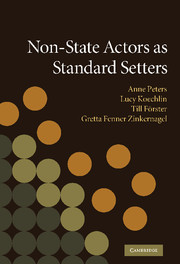Book contents
- Frontmatter
- Contents
- List of figures
- List of tables
- List of contributors
- Acknowledgements
- List of abbreviations
- Preface
- 1 Non-state actors as standard setters: framing the issue in an interdisciplinary fashion
- PART I New actors and processes in contemporary standard setting
- PART II The legitimacy and accountability of actors and standards
- PART III The authority and effectiveness of actors and standards
- 13 Standard setting for capital movements: reasserting sovereignty over transnational actors?
- 14 Certification as a new private global forest governance system: the regulatory potential of the Forest Stewardship Council
- 15 Private standards in the North – effective norms for the South?
- 16 International corporate social responsibility standards: imposing or imitating business responsibility in Lithuania?
- 17 Legal pluralism under the influence of globalisation: a case study of child adoption in Tanzania
- 18 Towards non-state actors as effective, legitimate, and accountable standard setters
- Index
- References
13 - Standard setting for capital movements: reasserting sovereignty over transnational actors?
from PART III - The authority and effectiveness of actors and standards
Published online by Cambridge University Press: 06 January 2010
- Frontmatter
- Contents
- List of figures
- List of tables
- List of contributors
- Acknowledgements
- List of abbreviations
- Preface
- 1 Non-state actors as standard setters: framing the issue in an interdisciplinary fashion
- PART I New actors and processes in contemporary standard setting
- PART II The legitimacy and accountability of actors and standards
- PART III The authority and effectiveness of actors and standards
- 13 Standard setting for capital movements: reasserting sovereignty over transnational actors?
- 14 Certification as a new private global forest governance system: the regulatory potential of the Forest Stewardship Council
- 15 Private standards in the North – effective norms for the South?
- 16 International corporate social responsibility standards: imposing or imitating business responsibility in Lithuania?
- 17 Legal pluralism under the influence of globalisation: a case study of child adoption in Tanzania
- 18 Towards non-state actors as effective, legitimate, and accountable standard setters
- Index
- References
Summary
Introduction
Standard setting with regard to capital movements has never been a state monopoly, at least for countries that maintain relatively open economies. From the first stock exchanges to contemporary rating agencies and hedge funds, institutional and technological innovations that allow capital to be allocated have been driven mostly by the ingenuity of private actors. In a historical perspective, the relationship between private capital owners and rulers appears as an eternal cat-and-mouse game, with the former looking for the best investment opportunities and the latter trying to subjugate these to their own objectives, especially revenue and economic stability.
The regulation of cross-border capital movements therefore constitutes a fascinating policy area for analysing the relationship between states and transnational actors. Capitalists rarely bother about borders if the grass is greener on the other side of the fence but their degree of autonomy depends on states' ambitions and capabilities to exercise authority and control over private capital movements. While transnational actors have become important subjects in the study of world politics, most research privileges them as autonomous. They are being examined in their efforts to create private rules or standards and to influence state actors in order to reach their material or normative goals. Consequently, models of the interactions between transnational and state actors rarely foresee the reverse: states influencing transnational actors to further their own interests. This relationship needs further investigation because states have been very active in reasserting their sovereignty vis-à-vis transnational actors.
- Type
- Chapter
- Information
- Non-State Actors as Standard Setters , pp. 351 - 378Publisher: Cambridge University PressPrint publication year: 2009
References
- 1
- Cited by



